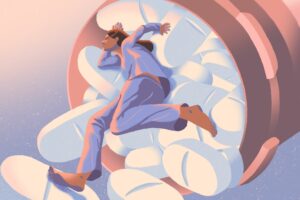From The Wall Street Journal: “The problem is that when you start taking a benzo, the brain reduces its natural output of GABA, which means that tapering off the medication can result in even worse symptoms of anxiety, along with extremely unpleasant withdrawal symptoms. I’ve seen many of my clients become dependent on benzos and then have to detox, an experience that causes sweating, headaches, muscular pain, insomnia, irritability and nausea. Excessive benzo use can also cause aggressiveness and poor judgment, and increase the risk of dementia in the long term.
. . . When it comes to navigating anxiety, facing your fears rather than running away from them—or drugging them into submission—is essential to reclaiming your freedom. Having uncomfortable emotions and sensations is normal. Taking a sedative is about escaping those sensations and emotions, when what we actually need to learn is to accept them. It’s almost a painful paradox that in instances when we most need to think, this medication blunts the capacity to be shrewd. I told Cameron that if he continued to take a pill to ‘calm down,’ in case of a nerve-racking situation like turbulence, he was setting himself up to become dependent on the pill instead of learning to navigate his anxiety.
Dr. Tola T’Sarumi, an addiction psychiatrist and instructor at Harvard Medical School, says that she prescribes benzos in small amounts to people who have been hospitalized for an acute psychiatric problem, knowing that she’ll taper them off this class of medication before they leave the hospital. But many people go on to use them for months and years, which creates complications and dangers, especially when, over time, you notice it’s not working as well. ‘And so you increase it again, and keep increasing it. And then you begin to realize that you can’t live without it,’ Dr. T’Sarumi explains.
‘Anything that quickly changes how someone feels is going to have abuse liability,’ says addiction psychiatrist Arthur Robin Williams of Columbia University. The allure of a substance that can help you feel less anxious or lonely in minutes may be powerful, Dr. Williams says, but the immediacy of symptom relief is a huge red flag for risk of dependence: ‘Over time, that’s going to lead to the quickest buildup of tolerance and the worst withdrawal.’ As Whitaker puts it, prolonged use of benzos can cause an ‘iatrogenic brain injury’—in other words, a medical treatment that causes a medical problem.”

***
Back to Around the Web











